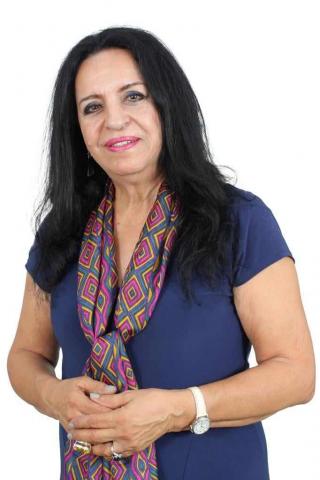Interview with longlisted author Inam Bioud
17/02/2025

When did you begin writing Houwariya and where did the inspiration for it come from?
I began writing Houwariya when I became aware that Algeria’s sufferings in the Black Decade, and my own and my family’s experiences, as well as those of my friends and work colleagues, was still etched deeply in my memory. The tears rise when I recall some of those tragic events. Even though those bloody and dark times have come to an end and there is security in most areas of the country, yet from time to time, the telltale signs prefiguring what was about to happen before it did, reappear once again in extremist ideas and visions, and in the indifferent attitudes of some of the elites who are still isolated from the troubles of society.
At that time (1990-1999), I was living in Oran and teaching Translation at the university there. In that welcoming city, I got to know people from different social classes, who left a deep impression on me. I became immersed in the delightful society of Oran, experiencing the simplicity and natural kindness of its people. Through fictional narrative, I wanted to understand how a society with these qualities could reach such extremes of violence.
Did the writing take long, and where were you when you finished it?
Writing the novel took about six years and I was extremely hesitant about publishing it. I felt it was like a personal monologue to process something painful inside, to justify my cowardice and atone for my lack of action. I wrote it between Algeria and the south of France, but I finished it in Algeria.
Do you have writing rituals?
As for writing rituals, I don’t think I have any. For this novel, I wrote when my university and administrative work permitted, usually in the quiet of night or at dawn. The sunrise is more inspiring for me than sunset. When I immerse myself in writing, I feel that I am really living. For that reason, I have decided to dedicate myself completely to writing and create special rituals for myself.
What is your next literary project after this novel?
After this novel, I want to dedicate more time to painting. I am trying to create some paintings which complete visually what I wasn’t able to say in words in the novel. But the subject which has been in my mind for a while is writing a fictionalised biography of the Algerian painter Baya (1931-1998), about her life in the colonial era (1938-1962). We had a strong friendship over a twenty-year period, until she died. This special human closeness with an exceptional human being and artist made me study the details of her rich life, beginning with her childhood as an orphan working in the house of European colonisers. They hosted the most prominent French cultural figures and artists, such as André Breton, Aimé Maeght and Albert Camus, while at the same time, Baya and her Algerian peers were deprived of education and their most basic rights to a dignified human life. Then there was the context in which her artistic talent developed, in which Algeria’s nationalist movement grew and the massacres of the 8th May occurred, the growth of the modernist literary and artistic movements and their relationship with similar movements in France, and finally the liberation revolution and independence.
What I aspire to is not just to write a historical novel, but to write a human story with a poetic vision which reflects Baya’s artistic sensibility.
